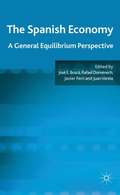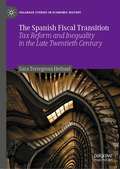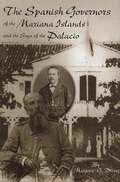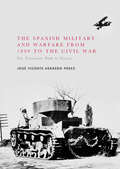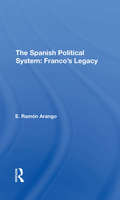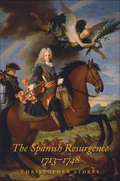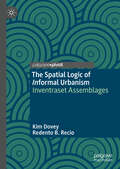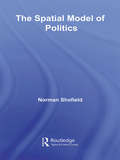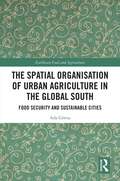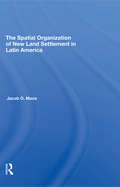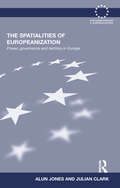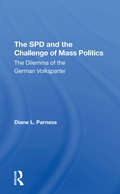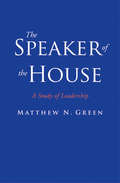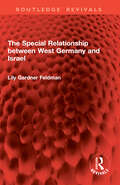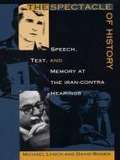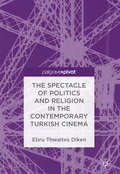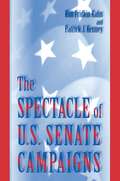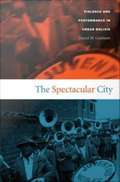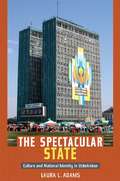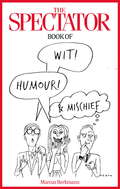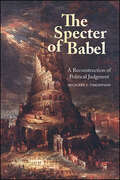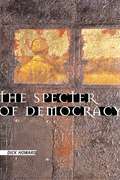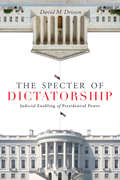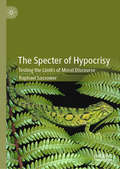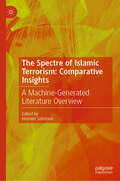- Table View
- List View
The Spanish Economy
by José E. Boscá Rafael Doménech Javier Ferri Juan VarelaThis book examines the pattern of growth of the Spanish economy in the last few decades, and studies the causes of its labour productivity, and the special features characterising business cycles in Spain.
The Spanish Fiscal Transition: Tax Reform and Inequality in the Late Twentieth Century (Palgrave Studies in Economic History)
by Sara Torregrosa HetlandThis book provides an analysis of the process and outcomes of the tax reform, with a focus on progressivity, redistribution, and inequality. Between 1977 and 1986, Spain underwent a comprehensive tax reform which shaped its fiscal system until today. It was made in connection with the transition to democracy and indeed was understood as a fundamental part of the political change. The book situates the reform both within Spanish history and international trends in tax systems and connects it to the expansion of the welfare state and regional decentralization in Spain. The analysis reveals that the tax system failed to attain progressivity, and significant levels of fraud had a noticeable impact on inequality. Because of this, fiscal redistribution remained limited. In the new political economy of the second globalization, late democratic and fiscal transitioners were unable to emulate the path of the welfare state forerunners.
The Spanish Governors Of The Mariana Islands And The Saga Of The Palacio
by Marjorie G. DriverMore than fifty Spanish officers served as governors during the 230 years that Spain administered the Mariana Islands, from 1668 to 1898. A dozen or so received six-year royal appointments, made in Madrid by the king, though the vast majority served three-year interim appointments, made in Manila by the Governor General or the Audiencia. In the nineteenth century, as the newly designated Province of the Mariana Islands, appointments to the governorship were often made by the Captaincy General of the Philippines. The source materials for this work are found primarily among the holdings of the Micronesian Area Research Center, Spanish Documents Collection, a secondary repository with copies of documentary materials concerning Micronesia from institutional collections in various parts of the world, though primarily Spain, Mexico, and the Philippines.
The Spanish Military and Warfare from 1899 to the Civil War: The Uncertain Path to Victory
by José Vicente Herrero PérezThis book explores the attitudes of the Spanish army officer corps towards the evolution of warfare during the early decades of the twentieth century, and their influence on the armies of the Spanish Civil War. It examines how the Spanish military coped with technological innovations such as the machine gun and the tank, how it adapted the army´s battlefield doctrine to changes in warfare before the Civil War, and the influence of this doctrine on the outcome of the conflict. Of the different armed forces that fought in the Spanish Civil War, it is paradoxically the Spanish army that remains most forgotten - especially its military doctrine. Scholarship on the Spanish military in this period focuses on its politics, ideology and institutional reforms, touching upon 'hard' professional issues only superficially, if at all. Based on original research and using largely unstudied Spanish primary sources, this book fills a major scholarly gap in the history of the Spanish army and the Spanish Civil War.
The Spanish Political System: Franco's Legacy
by E. Ramon Arango E Ramon ArangoIn few places, contends Professor Arango, do illusions obscure reality as they do in Spain. The Spaniard as well as the foreigner has believed and sustained the myths; the scholar as well as the poet. For the Spaniard, myth became the substitute for action in a world in which Spain was increasingly a nonparticipant. It replaced the reality of Spain
The Spanish Resurgence, 1713-1748
by Christopher StorrsA major reassessment of Philip V's leadership and what it meant for the modern Spanish state Often dismissed as ineffective, indolent, and dominated by his second wife, Philip V of Spain (1700-1746), the first Bourbon king, was in fact the greatest threat to peace in Europe during his reign. Under his rule, Spain was a dynamic force and expansionist power, especially in the Mediterranean world. Campaigns in Italy and North Africa revitalized Spanish control in the Mediterranean region, and the arrival of the Bourbon dynasty signaled a sharp break from Habsburg attitudes and practices. Challenging long-held understandings of early eighteenth-century Europe and the Atlantic world, Christopher Storrs draws on a rich array of primary documents to trace the political, military, and financial innovations that laid the framework for the modern Spanish state and the coalescence of a national identity. Storrs illuminates the remarkable revival of Spanish power after 1713 and sheds new light on the often underrated king who made Spain's resurgence possible.
The Spatial Logic of Informal Urbanism: Inventraset Assemblages
by Kim Dovey Redento B. RecioHighly informalized cities of the global South are often portrayed as chaotic and out of control - this book reveals a spatial logic of informal urbanism that is central to the economic life and livelihoods of such cities. 'Inventraset' is a concept that shows how informal street vending, transport and settlement are fundamentally integrated with each other and the more formal city. Street vending and transport provide crucial forms of employment and mobility, while informal settlement is the key source of affordable and adaptable housing. Informal urbanism is not ideal but it is the way such cities work; it is often hidden or camouflaged within the ideal of a clean, green and modern city to which middle-classes and elites aspire. Through comparative studies, with a focus on Manila and Jakarta, the book maps and analyzes how such cities work through alliances and synergies between vending, transport and settlement - inventraset assemblages are inventive and transgressive, yet settled.
The Spatial Model of Politics (Routledge Frontiers of Political Economy)
by Norman SchofieldUsing unique and cutting-edge research, Schofield a prominent author in the US for a number of years, explores the growth area of positive political economy within economics and politics. The first book to explain the spatial model of voting from a mathematical, economics and game-theory perspective it is essential reading for all those studying positive political economy.
The Spatial Organisation of Urban Agriculture in the Global South: Food Security and Sustainable Cities (Earthscan Food and Agriculture)
by Ada GórnaThis book examines the role and position of urban agriculture in the spatial and functional structure of cities in the Global South.In the face of dynamic urbanisation and negative consequences of climate change, one of the key challenges is not only how to provide food for the ever-growing urban population but also how to achieve urban sustainability and simultaneously reduce the negative impact of cities on the natural environment. These problems are particularly urgent in the metropolises of the Global South that are experiencing the greatest population growth while struggling with increasing social inequalities and the resulting uneven distribution of resources. Examining the role that urban agriculture can play in addressing these challenges, this book draws on three case study cities: Havana, Singapore and Kigali. The case studies, differing in socio-economic, spatial, political and environmental terms, exemplify diverse characteristics of urban agriculture in different geographical conditions. Drawing on fieldwork conducted in each city, the book also provides a unique perspective on the constraints in the development of urban agriculture and the use of its full potential for urban sustainability.This book will appeal to students and scholars, as well as decision makers, interested in the issues of urban sustainability, food security, spatial development and alternative food systems.
The Spatial Organization Of New Land Settlement In Latin America
by Jacob O MaosLand settlement in Latin America has become a subject of growing concern as governments renew efforts to develop agrarian potential and to relieve the pressure on overpopulated rural and urban areas. In this book, land settlement is viewed as the development of resources, both human and natural. The spatial organization of land settlement is examined in light of social and spatial patterns that may complement economic activities, lead to viable communities, and facilitate the provision of social and cultural amenities. The farm family is seen as the basic socioeconomic unit, and the family farmstead as the basic spatial nucleus.
The Spatialities of Europeanization: Power, Governance and Territory in Europe (ISSN)
by Alun Jones Julian ClarkEuropeanization is increasingly fashionable in the social sciences as a research focus as well as a backdrop for studies of the European Union and its relations with its member states. However, to date there is little consensus among the scholarly community over what Europeanization is or how it should be analyzed. Spatialities of Europeanization is the first work to comprehensively analyze contemporary research across the social sciences and humanities in order to bring together critically informed and previously unconnected contributions on this vital topic. The authors identify unexplored communalities between these different research traditions as well as shedding light on its neglected geographical and spatial dimensions which they argue are critical to understanding Europeanization in the 21st century. This book reflects a strong conceptual approach which is supported by detailed empirical materials drawn from interviews with policy elites at supranational, national and regional levels in the EU who are engaged in short, medium and long term EU policy planning and management. Offering fascinating empirically grounded insights into why Europe’s governance must now become more transparent and accountable to its 500 million citizens this book will appeal to scholars and researchers in the fields of Political Science, International and European Studies.
The Spd And The Challenge Of Mass Politics: The Dilemma Of The German Volkspartei
by Diane L ParnessThis book examines the inner dynamics of one of the most significant social democratic parties in Europe and weighs the causes and effects of the policies that have shaped its chequered post-war course. At a time when political developments in Europe command a hard look at options for the future, no party's post-war history offers more cogent lesso
The Speaker of the House
by Matthew N. GreenMatthew N. Green provides the first comprehensive analysis of how the Speaker of the House has exercised legislative leadership from 1940 to the present. Green finds that the Speaker's party loyalty is tempered by a host of competing objectives, including reelection, passage of desired public policy laws, handling the interests of the president, and meeting the demands of the House as a whole.
The Special Relationship between West Germany and Israel (Routledge Revivals)
by Lily Gardner FeldmanFirst Published in 1984, The Special Relationship between West Germany and Israel stresses the uniqueness of the historical ties between Germans and Jews, but attempts to set the implementation of post war German - Israeli policy relations in the context of a general theory of bilateral ties between states. Lily Gardner Feldman has articulated the concept of the special relationship and indicated its relevance for other international partnerships, including those between France and Germany and the United States and Israel.It is difficult to imagine a less likely bilateral relationship of friendship and mutual support after World War II than one between Germans and Jews. Yet in their simultaneous efforts to establish legitimacy in the family of nations, the Federal Republic of Germany and Israel turned to each other. And so, in one of history's greatest ironies West Germany looked to Israel for the Nazi victims to acknowledge the moral acceptability of the successor state and Israel looked to as Germany as the lone industrial state with both the means and the will to provide a measure of economic security. This book reveals the intricacies of the German- Israeli policy relationship in a setting of extensive and complicated ties between German and Israeli societies and individuals. It is based on more than 100 interviews with key actors in erstwhile West Germany and Israel. The innovative combination of theory and practice about such dramatic historical and contemporary importance should appeal not only to academics but also to the policy communities.
The Spectacle of History: Speech, Text, and Memory at the Iran-Contra Hearings
by Michael E. Lynch David BogenHow is history produced? How do individuals write--or rewrite--their parts while engaged in the production of history? Michael Lynch and David Bogen take the example of the Iran-contra hearings to explore these questions. These hearings, held in 1987 by the Joint House-Senate Select Committee on Secret Military Assistance to Iran and the Nicaragua Opposition, provided the nation with a media spectacle and a rare chance to see a struggle over the writing of history. There was Oliver North, prime suspect and designated scapegoat, turning into a hero of the American Right before the very eyes of the nation. How this transformation occurred, with the complicity of the press and the public, becomes disturbingly clear in The Spectacle of History.Lynch and Bogen detail the practices through which the historical agents at the center of the hearings composed, confirmed, used, erased, and denied the historical record. They show how partisan skirmishes over the disclosure of records and testimony led to a divided and irresolute outcome, an outcome further facilitated by the "applied deconstruction" deployed by North and his allies. The Spectacle of History immerses the reader in a crowded field of texts, utterances, visual displays, and media commentaries, but, more than a case study, it develops unique insight into problems at the heart of society and social theory--lying and credibility, the production of civic spectacle, the relationship between testimony and history, the uses of memory, and the interplay between speech and writing.Drawing on themes from sociology, literary theory, and ethnomethodology and challenging prevailing concepts held by contemporary communication and cultural studies, Lynch and Bogen extract valuable theoretical lessons from this specific and troubling historical episode.
The Spectacle of Politics and Religion in the Contemporary Turkish Cinema
by Ebru Thwaites DikenThis book explores how politics, religion and cinema encounter and re-invent each other in contemporary Turkish cinema. It investigates their common origin—the spectacle, which each field views as an instrument of governmentality. The book analyses six recent, some of which are internationally known Turkish films: The Messenger (Ulak), A Man’s Fear of God (Takva), Let’s Sin (İtirazım Var), SixtyOne Days (İftarlık Gazoz), The Imam and The Shadowless (Gölgesizler). Thwaites discusses how the cinematic nature of politics and religion unfold amidst the increasing media visibility of religion in contemporary Turkey. The chapters explore the relationship between art and religion, and compare religion and philosophy in their relation to truth, belief, and economy. Through close examination of these films, the author highlights the role of cinema in contemporary Turkey and at the heart of the religious paradigm.
The Spectacle of U.S. Senate Campaigns
by Kim Fridkin Kahn Patrick J. KenneyThis book offers a bold, comprehensive look at how campaigns actually work, from the framing of issues to media coverage to voters' decisions. In so doing, it challenges the common wisdom that campaigns are a noisy, symbolic aspect of electoral politics, in which the outcomes are determined mainly by economic variables or presidential popularity. Campaigns, the authors argue, do matter in the political process. Examining contested U.S. Senate races between 1988 and 1992, Kim Kahn and Patrick Kenney explore the details of the candidates' strategies and messages, the content, tone, and bias of the media coverage, and the attitudes and behaviors of potential voters. Kahn and Kenney discover that when the competition between candidates is strong, political issues become clearly defined, and the voting population responds. Through a mix of survey data, content analysis, and interviews, the authors demonstrate how competition influences serious political debates in elections. Candidates take stands and compare themselves to their opponents. The news media offer more coverage of the races, presenting evaluations of the candidates' positions, critiques of their political careers, and analyses of their campaign ads. In response, the voters pay closer attention to the rhetoric of the candidates as they learn more about central campaign themes, often adjusting their own voting criteria. The book concentrates on Senate races because of the variance in campaign strategy and spending, media coverage, and voter reactions, but many of the findings apply to elections at all levels.
The Spectacular City: Violence and Performance in Urban Bolivia
by Daniel M. GoldsteinSince the Bolivian revolution in 1952, migrants have come to the city of Cochabamba, seeking opportunity and relief from rural poverty. They have settled in barrios on the city's outskirts only to find that the rights of citizens--basic rights of property and security, especially protection from crime--are not available to them. In this ethnography, Daniel M. Goldstein considers the significance of and similarities between two kinds of spectacles--street festivals and the vigilante lynching of criminals--as they are performed in the Cochabamba barrio of Villa Pagador. By examining folkloric festivals and vigilante violence within the same analytical framework, Goldstein shows how marginalized urban migrants, shut out of the city and neglected by the state, use performance to assert their national belonging and to express their grievances against the inadequacies of the state's official legal order. During the period of Goldstein's fieldwork in Villa Pagador in the mid-1990s, residents attempted to lynch several thieves and attacked the police who tried to intervene. Since that time, there have been hundreds of lynchings in the poor barrios surrounding Cochabamba. Goldstein presents the lynchings of thieves as a form of horrific performance, with elements of critique and political action that echo those of local festivals. He explores the consequences and implications of extralegal violence for human rights and the rule of law in the contemporary Andes. In rich detail, he provides an in-depth look at the development of Villa Pagador and of the larger metropolitan area of Cochabamba, illuminating a contemporary Andean city from both microethnographic and macrohistorical perspectives. Focusing on indigenous peoples' experiences of urban life and their attempts to manage their sociopolitical status within the broader context of neoliberal capitalism and political decentralization, The Spectacular City highlights the deep connections between performance, law, violence, and the state.
The Spectacular State: Culture and National Identity In Uzbekistan
by Laura L. AdamsLaura L. Adams offers unique insight into nation building in Central Asia during the post-Soviet era through an exploration of Uzbekistan's production of national culture in the 1990s. As she explains, after independence the Uzbek government maintained a monopoly over ideology, exploiting the remaining Soviet institutional and cultural legacies. The state expressed national identity through tightly controlled mass spectacles, including theatrical and musical performances. Adams focuses on these events, particularly the massive outdoor concerts the government staged on the two biggest national holidays, Navro'z, the spring equinox celebration, and Independence Day. Her analysis of the content, form, and production of these ceremonies shows how Uzbekistan's cultural and political elites engaged in a highly directed, largely successful program of nation building through culture. Adams draws on her observations and interviews conducted with artists, intellectuals, and bureaucrats involved in the production of Uzbekistan's national culture. These elites used globalized cultural forms such as Olympics-style spectacle to showcase local, national, and international aspects of official culture. While these state-sponsored extravaganzas were intended to be displays of Uzbekistan's ethnic and civic national identity, Adams found that cultural renewal in the decade after Uzbekistan's independence was not so much a rejection of Soviet power as it was a re-appropriation of Soviet methods of control and ideas about culture. The public sphere became more restricted than it had been in Soviet times, even as Soviet-era ideas about ethnic and national identity paved the way for Uzbekistan to join a more open global community.
The Spectator Book of Wit, Humour and Mischief
by Marcus BerkmannApproaching its 200th birthday in the rudest of health, the Spectator is known for the quality of its writing and the deep eccentricity of some of its writers. Given the freedom to say what they want, they take that freedom and more, and the result is original, provocative, often very funny, sometimes plain wrong. From Jeffrey Bernard's reports from the Soho frontline and Auberon Waugh fulminating about hamburger gases in the early 1990s, we encounter in turn the wild stream of consciousness of Deborah Ross's restaurant reviews, the pinpoint etiquette advice of Mary Killen, Rod Liddle's frothing but elegantly sculpted outrage and the magazine's secret weapon, low life adventurer Jeremy Clarke. This bumper selection, which also includes eminent diarists, mad letter-writers and Boris Johnson, amounts to a masterclass in comic writing, lovingly compiled and edited by Marcus Berkmann, who still can't believe he wrote a monthly pop column for the magazine for twenty-eight years without being fired.
The Specter of Babel: A Reconstruction of Political Judgment
by Michael J. ThompsonIn an age of rising groupthink, reactionary populism, social conformity, and democratic deficit, political judgment in modern society has reached a state of crisis. In The Specter of Babel, Michael J. Thompson offers a critical reconstruction of the concept of political judgment that can help resuscitate critical citizenship and democratic life. At the center of the book are two arguments. The first is that modern practical and political philosophy has made a postmetaphysical turn that is unable to guard against the effects of social power on consciousness and the deliberative powers of citizens. The second is that an alternative path toward a critical social ontology can provide a framework for a new theory of ethics and politics. This critical social ontology looks at human sociality not as mere intersubjectivity or communication, but rather as constituted by the shapes that our social-relational structures take as well as the kinds of purposes and ends toward which our social lives are organized. Only by calling these into question, Thompson boldly argues, can we once again attempt to revitalize social critique and democratic politics.
The Specter of Democracy: What Marx and Marxists Haven't Understood and Why (Columbia Themes In Philosophy, Social Criticism, and the Arts)
by Dick HowardIn this rethinking of Marxism and its blind spots, Dick Howard argues that the collapse of European communism in 1989 should not be identified with a victory for capitalism and makes possible a wholesale reevaluation of democratic politics in the U.S. and abroad. The author turns to the American and French Revolutions to uncover what was truly "revolutionary" about those events, arguing that two distinct styles of democratic life emerged, the implications of which were misinterpreted in light of the rise of communism.Howard uses a critical rereading of Marx as a theorist of democracy to offer his audience a new way to think about this political ideal. He argues that it is democracy, rather than Marxism, that is radical and revolutionary, and that Marx could have seen this but did not. In Part I, Howard explores the attraction Marxism held for intellectuals, particularly French intellectuals, and he demonstrates how the critique of totalitarianism from a Marxist viewpoint allowed these intellectuals to see the radical nature of democracy. Part II examines two hundred years of democratic political life—comparing America's experience as a democracy to that of France. Part III offers a rethinking of Marx's contribution to democratic politics. Howard concludes that Marx was attempting a "philosophy by other means," and that paradoxically, just because he was such an astute philosopher, Marx was unable to see the radical political implications of his own analyses. The philosophically justified "revolution" turns out to be the basis of an anti-politics whose end was foreshadowed by the fall of European communism in 1989.
The Specter of Dictatorship: Judicial Enabling of Presidential Power (Stanford Studies in Law and Politics)
by David M. DriesenReveals how the U.S. Supreme Court's presidentialism threatens our democracy and what to do about it. Donald Trump's presidency made many Americans wonder whether our system of checks and balances would prove robust enough to withstand an onslaught from a despotic chief executive. In The Specter of Dictatorship, David Driesen analyzes the chief executive's role in the democratic decline of Hungary, Poland, and Turkey and argues that an insufficiently constrained presidency is one of the most important systemic threats to democracy. Driesen urges the U.S. to learn from the mistakes of these failing democracies. Their experiences suggest, Driesen shows, that the Court must eschew its reliance on and expansion of the "unitary executive theory" recently endorsed by the Court and apply a less deferential approach to presidential authority, invoked to protect national security and combat emergencies, than it has in recent years. Ultimately, Driesen argues that concern about loss of democracy should play a major role in the Court's jurisprudence, because loss of democracy can prove irreversible. As autocracy spreads throughout the world, maintaining our democracy has become an urgent matter.
The Specter of Hypocrisy: Testing the Limits of Moral Discourse
by Raphael SassowerRaphael Sassower examines the concept of hypocrisy for its strategic potential as a means of personal protection and social cohesion. Given the contemporary context of post-truth, the examination of degrees or kinds of hypocrisy moves from the Greek etymology of masks worn on the theater stage to the Hebrew etymology of the color adjustment of chameleons to their environment. Canonical presuppositions about the uniformity of the mind and the relation between intention and behavior that warrant the charge of hypocrisy are critically reconsidered in order to appreciate both inherent inconsistencies in personal conduct and the different contexts where the hypocrisy appears. Sassower considers the limits of analytic moral and political discourses that at times overlook the conditions under which putative hypocritical behavior is existentially required and where compromises yield positive results. When used among friends, the charge of hypocrisy is a useful tool with which to build trust and communities.
The Spectre of Islamic Terrorism: A Machine-Generated Literature Overview
by Hussein SolomonThis book presents the result of an innovative challenge, to create a systematic literature overview driven by machine-generated content. Questions and related keywords were prepared for the machine to query, discover, collate and structure by Artificial Intelligence (AI) clustering. The AI-based approach seemed especially suitable to provide an innovative perspective as the topics are indeed both complex, interdisciplinary and multidisciplinary, for example, climate, planetary and evolution sciences. Springer Nature has published much on these topics in its journals over the years, so the challenge was for the machine to identify the most relevant content and present it in a structured way that the reader would find useful. The automatically generated literature summaries in this book are intended as a springboard to further discoverability. They are particularly useful to readers with limited time, looking to learn more about the subject quickly and especially if they are new to the topics. Springer Nature seeks to support anyone who needs a fast and effective start in their content discovery journey, from the undergraduate student exploring interdisciplinary content, to Master- or PhD-thesis developing research questions, to the practitioner seeking support materials, this book can serve as an inspiration, to name a few examples. It is important to us as a publisher to make the advances in technology easily accessible to our authors and find new ways of AI-based author services that allow human-machine interaction to generate readable, usable, collated, research content.
